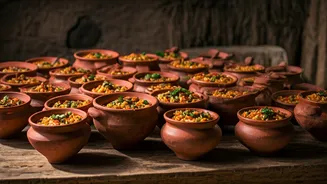Embrace Seasonal Eating
One key takeaway from tribal kitchens is the deep connection to seasonal eating. In the absence of modern preservation techniques, tribal communities relied
heavily on what nature provided at a specific time of year. This meant diets were naturally diverse, rich in nutrients, and perfectly aligned with the local ecosystem's rhythms. This practice ensures that food is consumed at its peak flavor and nutritional value, promoting a healthier and more sustainable lifestyle. Tribal kitchens teach us to appreciate the bounty of each season and to tailor our diets accordingly. This approach not only supports local farmers but also reduces the environmental impact associated with transporting foods over long distances. Moreover, the practice of seasonal eating makes food more exciting, as it introduces variety and keeps meals interesting throughout the year. The lessons from these kitchens show the importance of eating locally and seasonally for our health and for the environment.
Minimize Food Waste
Tribal kitchens excel in minimizing food waste, a crucial lesson in our modern world. Resourcefulness is a necessity when resources are limited, and these kitchens utilize every part of the ingredients. From roots and leaves to seeds and skins, nothing goes to waste. This efficient approach stems from a deep respect for nature and an understanding of the interconnectedness of all things. Traditional cooking methods often include making use of leftover ingredients to create new dishes. This practice fosters creativity in the kitchen while minimizing waste. It also teaches individuals to appreciate the value of every ingredient. The focus is always on making the most of what is available. Learning from tribal kitchens, we can adopt practices such as composting food scraps, planning meals around available ingredients, and repurposing leftovers. By doing this, we can significantly reduce the amount of food that ends up in landfills. This not only reduces environmental impact but also helps to conserve resources and save money. The commitment to minimize food waste is a cornerstone of sustainable living.
Prioritize Freshness & Flavor
Tribal kitchens prioritize freshness and natural flavors, focusing on minimally processed ingredients. These kitchens rarely use artificial flavors, preservatives, or other additives. This commitment to simple, unprocessed foods ensures the most nutrients and purest flavors in every meal. Cooking techniques in tribal kitchens often involve slow cooking over open fires. This enhances the natural flavors of ingredients. Freshly harvested produce, locally sourced meats, and the use of herbs and spices are the pillars of their culinary philosophy. The goal is to highlight the natural flavors of each ingredient rather than masking them with overpowering additives. The emphasis on freshness also means that dishes are usually prepared just before consumption, which maximizes nutritional value. This approach to cooking results in food that is both delicious and healthful. Adopting this philosophy of prioritizing fresh, natural ingredients can transform our meals, making them healthier and more satisfying. Tribal kitchens' approach provides a valuable blueprint for a healthier way of eating.
Embrace Simple Cooking Methods
Simplicity is a hallmark of cooking in tribal kitchens, where complex equipment and techniques are rare. Basic cooking methods such as boiling, roasting, and grilling are commonly used, with an emphasis on preserving the natural flavors of the ingredients. The focus is on allowing the quality of the ingredients to shine through, rather than relying on complex preparation. Traditional methods of cooking are often passed down through generations, and each dish reflects a sense of community and connection to the land. This approach to cooking offers benefits beyond just taste. It requires less energy, produces less waste, and promotes a deeper appreciation of the food. It also encourages creativity. When limited by tools and technology, cooks often find innovative ways to prepare simple meals with great flavor. Embracing simple cooking methods can bring a sense of calm and mindfulness to our kitchens, reminding us to savor the pure essence of food.
Foster Community & Sharing
Food in tribal kitchens is a social event. Meals are often shared, reflecting the importance of community and cooperation. Cooking and eating together fosters social bonds and strengthens the fabric of tribal life. Food is a way of connecting with others and sharing stories, laughter, and traditions. The communal approach to cooking and eating also reinforces a sense of belonging and mutual support. In these settings, cooking is rarely a solitary activity; rather, it's a shared experience. The preparation and consumption of food are occasions for celebration, remembrance, and the sharing of knowledge. We can learn from this example by eating meals together and making cooking a communal activity. This can strengthen our social bonds and bring a sense of joy to our daily lives. Tribal kitchens show us the importance of food as a means of connection.
Cultivate Respect for Nature
Tribal kitchens operate with a deep respect for nature and the environment. This respect extends to all aspects of food production, from sourcing ingredients to disposing of waste. These kitchens understand that food is a gift from the land and are committed to sustainable practices that preserve natural resources. This includes harvesting ingredients responsibly, minimizing environmental impact, and respecting the animals and plants. Tribal communities often have traditions of giving thanks for the food they consume, acknowledging the interconnectedness of all life. Such practices encourage mindful consumption. Through their reverence for nature, tribal kitchens emphasize the importance of living in harmony with the environment. By adopting this principle, we can promote sustainability, reduce our ecological footprint, and deepen our appreciation of the natural world. This practice helps to create a healthier planet for current and future generations.
Value Traditional Knowledge
Tribal kitchens are repositories of invaluable traditional knowledge passed down through generations. Culinary practices, recipes, and techniques are often rooted in centuries of experience. They reflect a deep understanding of ingredients, their nutritional properties, and how to prepare them to maximize health benefits. These kitchens often utilize ingredients that are specific to the local environment and that have medicinal properties. Tribal communities have an intimate knowledge of the land, its resources, and how to use them to nourish and heal. This knowledge is usually transmitted orally, preserving the cultural heritage of the community. In the modern world, we can value this knowledge by seeking out traditional recipes, learning about the origins of our food, and respecting the cultural practices associated with it. Learning from indigenous cultures is a way to gain a deeper understanding of food and its connection to health, culture, and the environment. Tribal kitchens stand as guardians of knowledge worth preserving and celebrating.



















